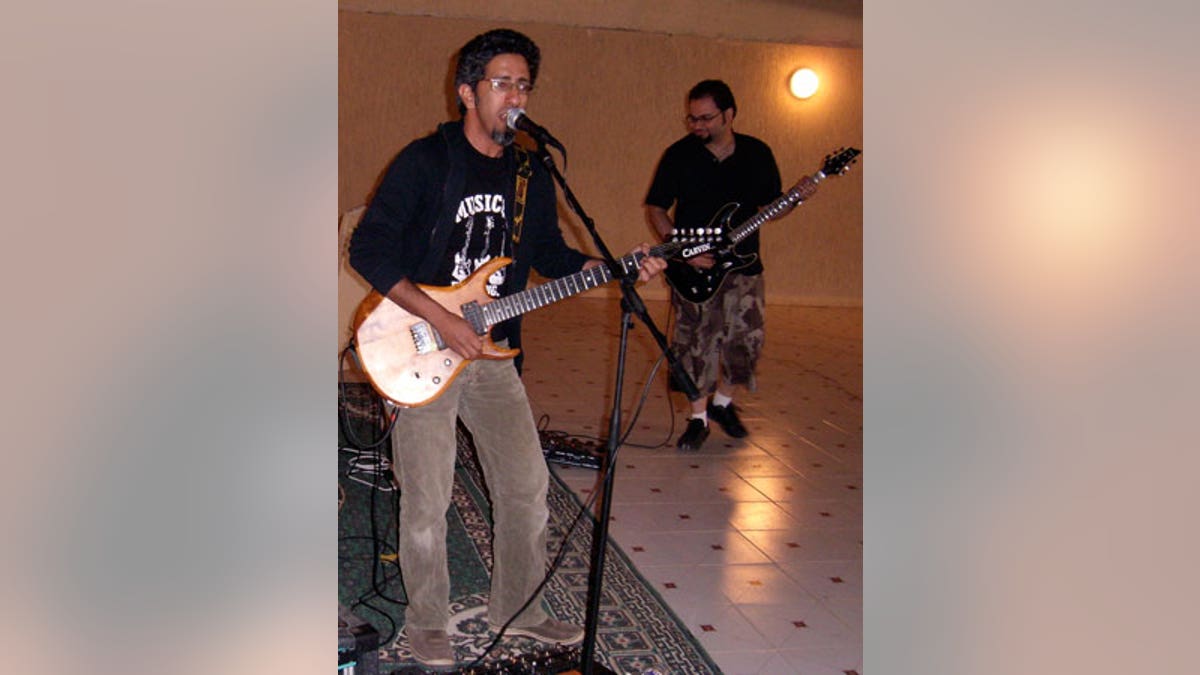
Saudi rock musician and journalist Hasan Hatrash, left, must contend with the unwelcome attention of Saudi Arabia's religious police, which frowns on Western-style music and dress. (Copyright 2005)
For young musicians in Saudi Arabia, rocking and rolling can mean risking everything.
The last three years have seen an explosion in the kingdom's underground music scene, with bands playing everything from hip-hop and rock to punk and death metal. There are currently more than 40 bands quietly rocking the nation, playing gigs in private homes, in residential compounds that house foreign workers and in tents in the middle of the vast Saudi desert.
But rocking in Riyadh and moshing in Mecca have their risks. The dreaded Mutaween — the Saudi religious police tasked with enforcing Shariah, the nation's strict Islamic law, feel you have to suffer if you want to sing the blues. They've arrested band members for holding concerts without permits, and they've charged some concert organizers with money laundering, according to Saudi musicians and human rights organizations that monitor the oil-rich kingdom.
The threat to the Saudi regime isn't the music itself, but rather the kingdom's teenagers and young adults, who have grown up with computers, iPhones and satellite TVs, said human rights advocate Ali Alyami.
"The biggest threat to Saudi stability isn't Al Qaeda. It's the Saudi youth. None of their needs or demands are being met.
"There's no jobs and people can't date. They see what their counterparts around the world have, and they want it too."
More than half of the kingdom's 28 million residents are under 25, and educated and tech-savvy youths who are drawn to the sounds of the West are using Internet tools like Facebook, Twitter and MySpace to get their ya-ya's out.
"These young people want an outlet. They're not allowed to drink or date girls, and so one of the few things they can do is start bands," said Alyami, director for the Center for Democracy and Human Rights in Saudi Arabia, a non-profit based in Washington D.C.
"Unfortunately the fear from the government side is that they consider this a threat to the system, and so they arrest them."
The numbers of musicians and concert organizers who have been arrested and jailed is a closely guarded government secret, Saudi watchers say. While Western-style music is technically not outlawed, there are no concert venues or clubs to hold shows, and bands must obtain permits from the government in order to play.
Saudi musicians say their music offers them a creative outlet to get their styles and messages out to fans and like-minded rockers in Europe, the U.S. and the rest of the Middle East. They say their sound helps dispel the notion that Muslims are interested only in terrorism and spreading jihad.
"Having long hair or being dressed in black with monster drawings on our shirts is considered to be abnormal here, buts it's not like we worship Satan or perform voodoo," said Jude Jd Aldajani, 24, who plays in a death metal band in Jeddah.
"We are proud of being Muslims rather than being hated by millions throughout the world."
But the Mutaween, who answer directly to King Abdullah and hold virtually unlimited power, view music as contradicting Wahhabi ideology and as a distraction from God, critics of the regime say.
Officials at the Saudi embassy in Washington D.C. did not return calls seeking comment.
With no studios available for them to record, Saudi musicians import their own equipment from the West and cut their own records in home studios, and they distribute their CDs for free, said guitarist and singer Mohammed Al-Hajjaj.
"We're fighting for acceptance and we are doing our best. We don't have any interest in politics. All we care about is the art and playing gigs," said Al-Hajjaj, who lives in the eastern port city of Damman and plays in a band called Sound of Ruby.
Al-Hajjaj, 30, has a degree in marketing and has recorded eight full-length CDs. He's now recording his first solo album in a home studio for a Saudi-based music label. He said he and his fellow band members were arrested at their first concert for not having a permit.
To get around the permit problem, musicians now get the word out on Facebook and other Web sites, and they perform word-of-mouth gigs in private homes and residential compounds that house Westerners, which are off-limits to the Mutaween.
Sound of Ruby has also performed across the border in music-friendly Dubai, which attracts big-name rock acts from all over the world.
Some Saudi watchers say the regime is slowly loosening restrictions. In 2008, the government for the first time allowed a mixed-gender audience to attend a Mozart performance sponsored by the German Embassy.
But slow isn't nearly fast enough in the age of the Internet, and the Web is rapidly bringing Western musical influences into the kingdom, which — unlike China — doesn't block access to Facebook and Twitter.
Hasan Hatrash, a Saudi journalist and rock musician, says government restriction of rock performances just makes the underground scene stronger.
"It's sad that a lot of talent is going to waste, especially with the lack of a regulated music scene," he said. "But on the other hand, it is this hard situation that really makes an artist and brings out the best in you, because you're expressing the reality in your work."
Hatrash said the underground gigs are packed, sometimes with as many as 500 fans, a feat accomplished through online buzz and organization, according to Aldajani, the death metal musician.
"The Internet has helped all sorts of musicians and artists in spreading their messages. Web sites like Twitter and iLike are helping fans reach us. Our music scene here is bursting and spreading to other countries, and we thank the Internet for our free marketing," Aldajani said.
